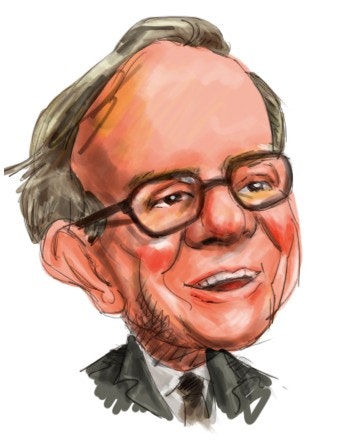As one of the ten most popular services stocks among hedge funds, Visa (NYSE:V) has a number of well-known owners. SPO Advisory, which is managed by John Scully, owned 7.4 million shares of V at the end of March; it was the fifth largest 13F position that the fund held (find out what other stocks SPO Advisory likes). SPO is a long-time major owner of Visa which has owned at least 7 million shares since the middle of 2011. Billionaire Stephen Mandel’s Lone Pine Capital- which Mandel founded after leaving Julian Robertson’s Tiger Management- owned 4.5 million shares after having doubled his position in the last quarter of 2011 (see what other positions Mandel has been adding to). Finally, Warren Buffett’s Berkshire Hathaway owns 2.9 million shares of the stock, which he first reported in his 13F filings for the end of September 2011 (see other stock picks from Warren Buffett).
Buffett’s reasons for investing in Visa are likely rooted in the legendary investor’s preference for value stocks with a strong brand name and market leadership position. Visa is certainly the market leader in the credit card business and has a famous, well-recognized brand that has come through the financial crisis with less damage to its reputation than many other finance-related companies. The fact that V trades at 20 times earnings makes it a questionable value investment, but the company has been successful in increasing its revenue and earnings over the last few years and has consistently narrowly beat earnings expectations. Its forward P/E is under 18.
Billionaire Julian Robertson is another hedge fund manager who is bullish about Visa and Mastercard (NYSE:MA). Last year Robertson said that these stocks aren’t exposed to credit risk and they will continue to grow at 20+% rates in the foreseeable future. He thinks these two stocks are more like technology stocks rather than financial services stocks (watch the interview below):
In Visa’s second fiscal quarter, ending March 31, the company reported revenue growth of 15% and earnings growth of 47% compared to its second quarter of 2011. Its first quarter was also strong, giving it revenue growth of 14% and earnings growth of 32% for the first half of its fiscal year. The positive results came from all three major sources of revenue- service revenues, data processing revenues, and international transaction revenues. Similarly, revenue growth occurred both in the U.S. and in the rest of the world. Visa also put an end to some uncertainty earlier this month when it and Mastercard settled with U.S. retailers who accused them of fixing interchange fees.
Visa is best compared to other credit card companies, such as Mastercard, Discover (NYSE:DFS), and American Express (NYSE:AXP), though American Express also runs a large travel management business. MA trades at a higher trailing multiple (27) and delivered lower revenue growth in its most recent quarter compared to the previous year than V did. However, analysts expect its earnings to rise more than V’s over the next year. American Express has a trailing P/E of 13, quite cheap, but its travel business is exposed to potential declines in tourism and travel that could stem from a weaker global economy. Discover- which has the weakest brand of the four major companies, and the lowest market cap at $18 billion- is the cheapest on a P/E basis, at a stock price of eight times its trailing earnings. Discover has been struggling from a business standpoint, with its most recent quarterly earnings down from the same quarter a year ago. So far this year, Visa is up a little over 20%, narrowly outperforming MA and AXP (Discover stock, unlike the company, is having an excellent year and is up about 45%). All four stocks are beating the S&P 500.
While an investor in Visa would be in excellent company, we are skeptical of it as a value stock and think that there are likely other investments which are better suited for the current economic environment. Global slowdown and the recession in Europe will cool down these stocks and give investors a better opening over the next 12 months.
